Who Was Johnny Hodges?
In the annals of jazz history, certain names stand out like luminous stars against the night sky. Among them, John Cornelius "Johnny" Hodges occupies a place of reverence, his soulful melodies echoing through the corridors of time. Born on July 25, 1907, in Cambridge, Massachusetts, Hodges embarked on a musical journey that would leave an indelible mark on the world of jazz.

Hodges' early years were marked by a deep immersion in music. Growing up alongside talented saxophonists like Harry Carney and Charlie Holmes, Hodges found his passion ignited. His first forays into music were on drums and piano, instruments that laid the foundation for his later mastery of the saxophone. Despite lacking formal training, Hodges's innate talent shone brightly, earning him recognition in the vibrant musical community of Boston.
The turning point in Hodges's career came when he encountered the legendary Sidney Bechet, a moment that would shape his destiny. Impressed by Hodges's skill on the soprano saxophone, Bechet became a mentor, guiding the young musician towards his calling. With Bechet's encouragement, Hodges set his sights on New York City, the epicenter of jazz innovation.
In 1928, Hodges' path intersected with greatness when he joined the Duke Ellington Orchestra, marking the beginning of a legendary partnership. His velvety tone and effortless virtuosity quickly distinguished him as one of the premier saxophonists of his time. Hodges' collaborations with Ellington produced timeless classics like "Jeep's Blues," "Sultry Sunset," and "Passion Flower," each a testament to his unparalleled artistry.
Hodges' influence extended far beyond the confines of the Ellington orchestra. His mastery of the alto saxophone garnered praise from contemporaries and successors alike. Benny Goodman hailed him as the greatest alto saxophonist he had ever heard, while Charlie Parker likened him to the operatic soprano Lily Pons, a testament to Hodges' unique brilliance.
At the heart of Hodges' musical persona was his distinctive sound, characterized by a pure tone and melodic economy. Whether weaving through blues riffs or serenading audiences with ballads, Hodges imbued each note with emotion, captivating listeners with his unparalleled expressiveness. His innovative use of vibrato and seamless transitions between notes set him apart as a true virtuoso of his craft.
Instrumental to Hodges' sonic identity were his choice of saxophones. From the Conn 6M to the Buescher 400 and finally the Vito LeBlanc Rationale, Hodges meticulously curated his instrument to achieve the perfect sound. His silver-plated Vito saxophone, adorned with intricate engravings, became an extension of his musical soul, channeling his emotions into every performance.
If you are interested in learning music check out our Music Lessons in Tulsa.
Tragically, Hodges' illustrious career was cut short by his untimely death on May 11, 1970. Yet, his legacy endures as a beacon of inspiration for generations of musicians to come. Duke Ellington aptly captured the essence of Hodges' contribution, lamenting that "the band will never sound the same without Johnny." In a poignant eulogy, Ellington celebrated Hodges' transcendent talent, describing him as a musician whose tone could evoke tears—an artist whose music resonated with the deepest recesses of the human soul.
As we reflect on the life and legacy of Johnny Hodges, we are reminded of the transformative power of music. Through his saxophone, Hodges transcended barriers of time and space, connecting with audiences on a profound emotional level. His music remains a testament to the enduring legacy of jazz, a genre fueled by the passion and creativity of visionaries like Johnny Hodges. Though he may have left this world, his melodies continue to echo, a timeless reminder of the boundless potential of artistic expression.
Beyond his technical prowess and emotive playing style, Hodges' legacy resides in his ability to transcend musical boundaries. His collaborations with Duke Ellington epitomized the fusion of innovation and tradition, shaping the landscape of jazz for decades to come. Through their partnership, Hodges helped redefine the role of the saxophone in big band arrangements, elevating it to a position of prominence and influence.
Moreover, Hodges' influence extended beyond the confines of the jazz world, permeating popular culture and inspiring countless artists across genres. From bebop to rhythm and blues, his melodic sensibilities resonated with musicians seeking to imbue their craft with depth and soul. His iconic solos became touchstones for improvisation, guiding aspiring saxophonists on their own creative journeys.
Hodges' impact also reverberated internationally, as his performances captivated audiences on stages around the globe. From the smoky clubs of Harlem to the grand concert halls of Europe, his music transcended cultural boundaries, speaking to the universal language of human emotion. His tours with the Ellington orchestra introduced audiences worldwide to the rich tapestry of jazz, fostering a global appreciation for its rhythmic complexities and improvisational spirit.
Even in death, Hodges' influence remains palpable, as his recordings continue to inspire new generations of musicians. His compositions and performances serve as a reservoir of creativity, offering endless possibilities for reinterpretation and exploration. Whether through reissues of classic albums or reinterpretations by contemporary artists, Hodges' music endures as a testament to the enduring power of artistic expression.
In conclusion, Johnny Hodges' legacy looms large in the pantheon of jazz greats, his contributions leaving an indelible mark on the fabric of musical history. Through his transcendent talent and unwavering dedication to his craft, he paved the way for future generations of saxophonists and musicians, shaping the evolution of jazz and influencing the course of modern music. As we celebrate his life and music, we honor not only the man but also the timeless legacy of creativity, innovation, and passion that defines Johnny Hodges' enduring impact on the world of jazz.
If you like this check out our article: Who Is Benny Golson?
